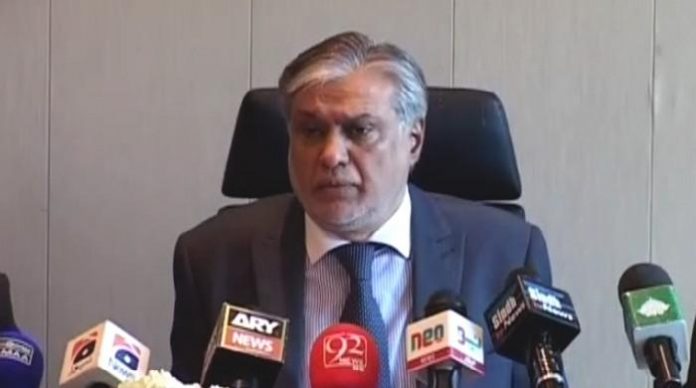Pakistan on Wednesday adjusted its fiscal deficit target by a significant margin, owing to a shortage in revenue collection, media sources have reported. The International Monetary Fund (IMF) has shown concerns over challenges in the country’s fiscal, energy and external sectors owing to a negative trade balance partially reflected by an increase in imports of energy and capital goods and stagnating remittances.
According to IMF Mission Chief Harald Finger forecasts, Pakistan’s current account deficit could reach 2.9pc of GDP during the current financial year.
“During FY2017, the [fiscal deficit] is now projected to reach 4.1pc of the GDP,” Finance Minister Ishaq Dar is reported to have said at the conclusion of Article-IV consultations with the IMF in Dubai. This is higher than the targeted fiscal deficit limit of 3.8pc of the GDP for the current fiscal year.
Dar further informed that revenue collection remained challenged with a shortfall of Rs100b due to lower oil prices and a support package for exports and agriculture, which necessitated an easing of the deficit limit.
“The shortfall that the FBR experienced in the first eight months was due to the pro-growth incentives offered to various sectors of the economy, particularly exports and agriculture; the major revenue gap amounting to Rs100 billion was [caused by] not passing the full impact of increasing oil prices to the common man,” he stated.
In a concluding statement of the ongoing talks, the IMF warned that “a number of challenges in the fiscal, external and energy sectors could affect the hard-won stability gains in the period ahead”, calling “for strong efforts with respect to fiscal consolidation and the implementation of key structural reforms, and vigilance in managing the country’s external position”.
On the other hand, the IMF predicted growth forecast for Pakistan of 5pc for the ongoing fiscal year and 6pc for the next fiscal year, with average inflation to be contained at 4.3pc.
The finance minister conceded that the current deficit would almost double, with the trade deficit at $20 billion. He hoped to tackle the negative trade balance through improved exports in information technology (IT), diversifying markets for local exports and introducing new product lines in the coming year. He complained that IT exporters preferred keeping most of their earnings abroad as official IT exports stood at about $600m, against actual exports of $2b.
Dar also said his government would bring down the net public debt, which stood at 60.2pc at the close of FY2016, in order to target sustained growth. The minister also vowed further structural reforms in the energy, monetary policy as well as financial and public sector enterprises.
Dar showed optimism pointing out there was sustained growth in the economy for the third consecutive year and stated 42pc growth in imports was from capital goods – plants and machinery – that would further accelerate the process of economic growth and would help in generating employment opportunities. Export quantities, he claimed, were increasing even though prices were on the decline globally.
Large-scale manufacturing also witnessed growth mainly in the sectors of cement production, steel, pharmaceuticals, automobiles, paper and electronics.
He further added that agricultural sector would respond to various government initiatives provided in the budget 2016-17, with prospects of better cotton, sugar and maize production, in addition to an increase in wheat production.
The minister claimed that the fiscal deficit did not impact development spending, which had doubled in three years. He further stated that foreign exchange reserves had decreased from $23 billion to $22 billion, but were expected to increase by the end of June this year.
The IMF anticipated economic growth to reach 5pc by the end of the year, on the back of improved global economic conditions, China-Pakistan Economic Corridor (CPEC) related investment in the country and speedy recovery in the agricultural sector. However, the IMF pointed out the large-scale manufacturing (LSM) did not achieve its growth targets and exports remained lower than expected.
The IMF stressed that economic policies need to focus on maintaining stability in the fiscal, external and energy sectors. ‘Stronger fiscal consolidation’ is needed to recover from the shortfall in the revenues and the policies should focus on bringing down the fiscal deficit gap. The IMF also stressed for greater exchange-rate flexibility and efforts to boost exports to improve the trade balance as well as absorbing the capital outflow of funds related to CPEC developmental projects. The IMF concluded by stressing on bringing down the losses of the power sector and achieve full cost recovery. This will prove beneficial for sustainability of new energy initiatives and reduce fiscal costs, it stated.




